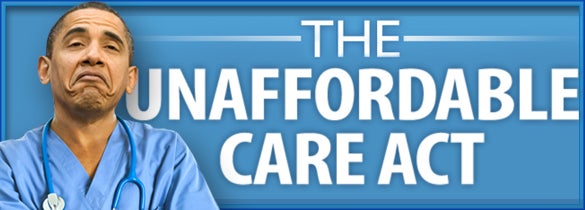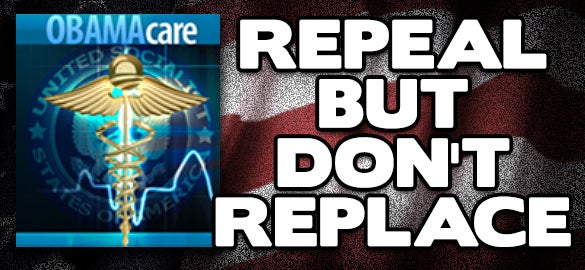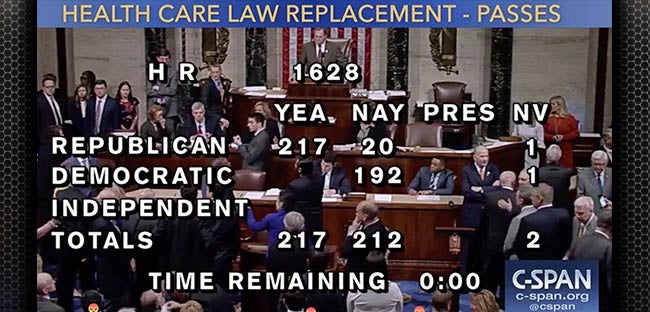RUSH: Let’s get to some of the details of this bill. And this is in as simple language and explanation as I can make it. It’s a side-by-side comparison of what was in Obamacare and what’s changing, what’s being kept, and what’s being removed. Now, under Obamacare, the individual mandate requires people who can afford it to go out and buy health insurance. This House Republican bill repeals that. Kind of.
Because there is a caveat.
It is repealed. However, there are penalties in the House bill, the Republican bill, if you don’t have insurance. Well, they’re not penalties. The penalties that are in Obamacare would disappear. The change is that if you go uninsured for more than 63 days, you will have to pay a 30% surcharge on your premium when you get insurance. This is said to be an incentive designed to encourage people to maintain insurance coverage. So while they’re repealing the individual mandate and repealing the penalties, they are replacing that with a proviso that you can’t go longer than two months without coverage.
Well, you can. But if you do, you’re going to have a 30% surcharge added to your premium when you do get a policy. Now, some are going to think this is a distinction without a difference. You say you’re repealing the individual mandate and repealing penalties, but then there’s a penalty here if you don’t have insurance. You can go 63 days without having a policy, and then if you do do that, when you finally sign up and get insurance, you have a 30% surcharge on your premium. Now, they think the employer is going to bear the brunt of this.
One-hundred-and-fifty-nine million people get their insurance through their employers. One of the Obamacare objectives was to add on to that, and they were not able to make that happen fast enough. But getting off your enrollment at your company would automatically direct you to an exchange or to government single-payer. That’s where they wanted Obamacare to go. Employer mandate. “In Obamacare, the employer mandate required larger companies to provide affordable insurance to their employees.”
That has been repealed totally, and that’s it. So employers no longer are required to provide “affordable insurance” to their employees. “But that’s not good, Rush!” Well, it’s going to work out because as job creation happens and employment ramps up, the competition for employees is going to result, and employers will sweeten the pot on the benefits side as incentives to people to sign up. So that, theoretically, will work out.
 “Subsidies for out-of-pocket expenses under Obamacare, tax credit under Obamacare, will be extended to help some people pay deductibles and copayments.” The House Republican bill repeals this in 2020. Not immediately. It repeals it in 2020. So the tax credits to help some people pay deductibles and make copayments will remain. Taxes: Under Obamacare there were new taxes on high incomes, new taxes on prescription drugs. There were taxes on medical devices — including indoor tanning salons, if you recall. The Republican bill repeals these.
“Subsidies for out-of-pocket expenses under Obamacare, tax credit under Obamacare, will be extended to help some people pay deductibles and copayments.” The House Republican bill repeals this in 2020. Not immediately. It repeals it in 2020. So the tax credits to help some people pay deductibles and make copayments will remain. Taxes: Under Obamacare there were new taxes on high incomes, new taxes on prescription drugs. There were taxes on medical devices — including indoor tanning salons, if you recall. The Republican bill repeals these.
It rolls back the tax increases, which have been imposed under Obamacare to help pay for coverage expansion. So all those taxes are gone. New taxes on high incomes, taxes on prescription drugs, taxes on medical devices, indoor tanning, gone. Medicaid expansion. “Under Obamacare, more than 30 states expanded coverage by raising the eligibility cut-off to 138% of the poverty level.” Now, on this one, we’re definitely in the weeds here. And this, to me, is the epitome of what’s wrong when the government gets involved.
What the hell is this? Medicaid expansion. Medicaid is welfare, health care for the poor. More than 30 states expanded coverage with Medicaid by raising the eligibility cut-off to 138 percent of the poverty level. What this means is that whatever the annual income that’s called poverty is, 138 percent of that, you could still qualify for Medicaid. States raised it to that in order to get more people qualified.
Here’s the way it changes in the Republican bill. The Republican bill will let states keep the Medicaid expansion that they’ve engaged in and would allow states that expanded Medicaid to continue getting federal funding as they would have under Obamacare, until 2020. Federal funding for people who became newly eligible, starting in 2020, or who left the program and came back, would be reduced. In other words, the amount of money available for newly arrived people under the state Medicare expansion, the money, the pool of money for those people would be reduced. States that have not expanded Medicaid already would not be allowed to do so in the future.
 The Republican bill also allows states to impose work requirements for some Medicaid beneficiaries. Remember Medicaid is for the poor. Medicare is for our seasoned citizens. Medicaid will allow states to impose work requirements for some Medicaid beneficiaries. So if you’re going to get Medicaid under the Republican plan, you may have to work for it. It proposes capping federal funding per enrollee based on how much each state was spending in 2016. States also have the option to receive a lump sum, block, grant, if they want — you following all this? You’re following? You could explain this to me? So what does this mean? You can’t explain it, but you understand what I’m saying? Okay. Cool.
The Republican bill also allows states to impose work requirements for some Medicaid beneficiaries. Remember Medicaid is for the poor. Medicare is for our seasoned citizens. Medicaid will allow states to impose work requirements for some Medicaid beneficiaries. So if you’re going to get Medicaid under the Republican plan, you may have to work for it. It proposes capping federal funding per enrollee based on how much each state was spending in 2016. States also have the option to receive a lump sum, block, grant, if they want — you following all this? You’re following? You could explain this to me? So what does this mean? You can’t explain it, but you understand what I’m saying? Okay. Cool.
Preexisting conditions policy, under Obamacare, insurers were required to cover people regardless of preexisting medical conditions. Obamacare prevents insurance companies from setting prices based on a customer’s health history. Well, there you go. Whatever this is, that isn’t insurance. I’m not trying to offend anybody. And you may think, “So what if it’s not insurance. We’re not talking about insurance. We’re talking about our people being treated. We’re talking about people being able to pay for it.”
Okay. Fine. That’s all that matters, then Obamacare required insurers to cover people whether they have preexisting conditions or not, which is going to totally destroy — the reason it matters, folks, is because it blows the pricing structure out the wazoo. Obamacare bars insurance companies from setting prices based on a customer’s health history, meaning they can’t charge you more if you’re always going to be sick. “That’s right, Rush! That’s only fair.” No, it’s not. Not if we’re calling it “insurance.”
Listen, you’re age 20. You go get a life insurance policy. It’s going to cost you X because the tables say you’re going to live 50 more years or 60. When you’re 70 and go buy a life insurance policy, what do you think it’s going to cost you? It’s going to cost you a hell of a lot more because you’re not going to be alive that much longer to pay premiums, so the risk is much greater that you’re going to die. So it’s going to cost differently. That’s how insurance works.
 But I don’t want to split hairs. Here’s the change in the Republican bill. The Republican bill allows states to wave the rule, restricting price differences based on health. That means that there can be price distinctions on people with preexisting conditions, people in bad health, and people who are healthy. And that matters because this is how premiums are going to come down for healthy people, which is the vast majority of the people we’re talking about here. And this is one of the fundamental necessities of this bill, is to bring down costs.
But I don’t want to split hairs. Here’s the change in the Republican bill. The Republican bill allows states to wave the rule, restricting price differences based on health. That means that there can be price distinctions on people with preexisting conditions, people in bad health, and people who are healthy. And that matters because this is how premiums are going to come down for healthy people, which is the vast majority of the people we’re talking about here. And this is one of the fundamental necessities of this bill, is to bring down costs.
This provision is the first step toward bringing down costs. Insurers would be allowed to charge higher prices to sick customers who had experienced a lapse in coverage of more than 63 days, as long as the state also set up a program to help high-risk patients obtain insurance. Another thing this does is — it doesn’t farm it out. But it sends it to the state to handle this because prices differ from state to state. Populations differ. Demographics differ.
Remember, in any situation like this, the closer you can devise your solution to the root of the problem, the more efficient the solution. Why Washington should be coming up with a uniform, unilateral policy for everybody in every state is ridiculous. Letting the states handle this is also a mechanism for lowering premiums. In addition, in the Republican bill, it would add — and this is the lightbulb guy’s deal — it would add $8 billion over five years to help people with preexisting medical conditions in an effort to satisfy Republicans who voiced concern about the effects of these waivers.
The lightbulb guy thought that the relaxing of the waivers, meaning insurance companies can now charge different prices based on a person’s health — which there doesn’t need to be a law for that. The reason we do is because Obama blew that up. The lightbulb guy said that’s going to result in preexisting condition people having to pay more, so we need more in the pool. So Trump said, “Okay, we’ll throw $8 billion in there.” And the lightbulb said, “Fine, fine. Thank you for letting us twist your arm.”
BREAK TRANSCRIPT
RUSH: I’m going to repeat something I said yesterday. Under Obamacare preexisting condition costs were coming out of the premiums that everybody else paid. So that’s one of the reasons premiums under Obamacare skyrocketed, is because that money was what was being used to pay for preexisting conditions. And this is why Obama really soaked young people.
 The idea was, young people, they’re never going to make claims. They’re healthy. They weren’t going to get sick. So just charge the hell out of them and use that money for the elderly, the sick, and preexisting conditions. The young people said, “Screw it. I’ll pay the penalty. I’m not dumb. I don’t have the money to pay this anyway.” So it broke down.
The idea was, young people, they’re never going to make claims. They’re healthy. They weren’t going to get sick. So just charge the hell out of them and use that money for the elderly, the sick, and preexisting conditions. The young people said, “Screw it. I’ll pay the penalty. I’m not dumb. I don’t have the money to pay this anyway.” So it broke down.
Now, under Obamacare, essential health benefits is where Obama really stacked the deck on Obamacare and was able, after the bill was passed, to just randomly choose things that he would require insurance companies to cover, such as maternity care, veterinary maternity care. Insurance companies had to pay for whatever Obama wanted.
This is how he made the Catholic church have to pay for abortifacients, emergency services, preventative services. Whatever Obama wanted the insurance companies to pay for, he threw in there. He did it via the secretary of Health and Human Services. But they were called essential health benefits.
In the Republican bill, states are allowed to waive all of that and set up their own standards. The Obama essential health benefits are gone. Or will be. And that is another huge, huge cost savings. Because the insurance companies were raising premiums every time Obama said, “You got to cover this. You got to cover that. The Catholic Church has to pay for employees to get abortions.” Whatever Obama mandated the insurance companies had to raise prices on their premiums. And that’s one of the reasons why premiums were skyrocketing.
The Republican bill brooms it and lets the states decide if and what. And Tom Price will be involved in this, of course, as Secretary of Health and Human Services. But these two things, the preexisting condition change and the essential health benefit change are the two primary mechanisms that are thought to seriously lower everybody’s insurance premium. And that’s when Poppy Harlow at CNN said that sick children, sick kids are now going to be the responsibility of the Republican Party.
BREAK TRANSCRIPT
RUSH: Here is Skip in Winston, North Carolina. Welcome. Great to have you here.
CALLER: Hey, Rush. Good to be with you, man.
RUSH: Thank you, sir.
CALLER: I wanted to thank you for focusing on the preexisting condition language in Obamacare and back you up on that. Here’s my point: The Obamacare preexisting condition language has to go if you want the companies that are still in the health insurance business to stay and the ones that have gotten out, to get back in. And here’s why: If you leave his language in there — if you leave the current ACA preexisting language in there — then you have to do three hugely unpopular things to go with that.
And those are the individual mandate — it would have to stay — number two, the penalty tax each other year would have to be far greater than it is right now, say $3,000 to $5,000 a year. And the third and most unpopular feature is you would have to close the ERs to adults that claim they don’t have money or insurance. If you don’t do those three things, people are going to game the system, and the carriers will stay out.
RUSH: And the latest carrier to announce they’re getting out… This is in Iowa. Skip, brother, thanks very much. I’ll expand on his point here in just a second. He’s speaking of the language in Obamacare, which I briefly reviewed here moments ago. “Medica…” M-E-D-I-C-A. (I’m not sure how they pronounce it.) “Medica, a Minnesota based health insurer, released a statement suggesting it was close to following two larger carriers in deciding not to sell such policies in Iowa for 2018, due to instability in the market.
“Tens of thousands of Iowans could be left with no health insurance options next year, after the last carrier for most of the state announced Wednesday that it likely would stop selling individual health policies here. Medica, a Minnesota-based health insurer, released a statement suggesting it was close to following two larger carriers in deciding not to sell such policies in Iowa for 2018, due to instability in the market. ‘Without swift action by the state or Congress to provide stability to Iowa’s individual insurance market, Medica will not be able to serve the citizens'” there.
 Now, you know, with Millennials… You know one of the big words that Millennials have today? “Stainability.” It’s a big word that is part of the leftist lexicon. It’s a good word, don’t misunderstand. But it has been appropriated by the left to mean the status quo of whatever the left wants must remain. And if it does, that’s good. That’s stainability. And so young Millennials have decided that if something is not sustainable, it isn’t good. If it is sustainable, then it’s wonderful — and since they say stainability is everything, well, here you have another example.
Now, you know, with Millennials… You know one of the big words that Millennials have today? “Stainability.” It’s a big word that is part of the leftist lexicon. It’s a good word, don’t misunderstand. But it has been appropriated by the left to mean the status quo of whatever the left wants must remain. And if it does, that’s good. That’s stainability. And so young Millennials have decided that if something is not sustainable, it isn’t good. If it is sustainable, then it’s wonderful — and since they say stainability is everything, well, here you have another example.
Obama and the Democrats gave you unsustainable health care. They created an economy that for many Millennials made paying your student loans unsustainable. They promised solar and wind energy would sustain your energy needs. And they can’t. Businesses are just as troubled. And unaffordable health insurance. So there is literally no stainability in Obamacare. Literally! It’s falling apart right before our very eyes. Have you wondered…? When you see the insurance companies dropping out — and I know you know it. We report it here.
It’s been happening ever since… It probably started a year after Obamacare was signed into law. I wonder how many people actually stop and ask themselves why, or do they just conclude the insurance companies are a bunch of tightwad cheap SOBs and they don’t want to help people. Because that’s what the left tries to convince as many people as possible that all businesses do. That businesses, industries don’t care about you. “They’d just as soon you’d die. They don’t care if your policies or their products kill you.
“So if they’re getting out of the insurance market, it means they don’t care if you get sick. It means they don’t want to pay to help you. They don’t want to pay to keep you healthy!” A lot of people think this because that’s what the left has fostered for a decade in their anti-capitalist and anti-corporate lens. But there’s a reason these insurance companies are getting out. And that is, people cannot afford the premiums they’re having to charge. They just can’t afford them. And if people are not buying policies, you can’t make any money by offering things people don’t buy.
And if the policies are so expensive because the government mandates what you must cover, then the only option you have is getting out. A reason the insurance companies so eagerly embraced this, I think, was a mixture of folly and stupidity. The way Obama roped them in, folks, was with the mandates. Predominantly the individual mandate. Obamacare made it federal law that every one of us had to buy a product. That product was health insurance.
 Now, if you’re the CEO, the CFO, the COO, or if you’re even the janitor at a health insurance company and you realize one day that every American has to buy your policy, what a godsend! You don’t have to advertise anymore. There’s no competition within the states. You’ve got a federal law with penalties for failure to comply that people must buy it. So it was a win-win. How could they lose? Of course, they got in line with this. Of course, they ended up supporting Obamacare. But the shortsightedness: People can’t buy what they can’t afford. And that’s where we are.
Now, if you’re the CEO, the CFO, the COO, or if you’re even the janitor at a health insurance company and you realize one day that every American has to buy your policy, what a godsend! You don’t have to advertise anymore. There’s no competition within the states. You’ve got a federal law with penalties for failure to comply that people must buy it. So it was a win-win. How could they lose? Of course, they got in line with this. Of course, they ended up supporting Obamacare. But the shortsightedness: People can’t buy what they can’t afford. And that’s where we are.
And the reason these premiums are skyrocketing is because all of the mandates and requirements that Obama has slapped on insurance companies. In addition to liberalism’s anti-capitalist bias, they also have this nonsensical belief that every corporation is rich with money that it’s not spending. It’s got money over there. It’s hoarding it. It’s stealing it. It’s giving it to its CEO or whatever. It’s not sharing it with anybody because they’re selfish and greedy. And so we’re going to get more of that money. They don’t realize that in a world dominated by liberal policies, that businesses are barely able to get by with all the penalties and taxes and regulations.
And the insurance industry, even with a federal mandate couldn’t stay in business. To give you an idea of how bad Obamacare is, with the entire adult population of the United States as a market which must buy their product, they still can’t stay viable. That’s how bad Obamacare is. And that’s why it’s going to continue to collapse. And, by the way, this was the design. As all of these insurance companies get out of it, well, people still need health insurance and they still need treatment. They’re still going to get sick. They’re still going to need to go to the hospital. They’re still going to need to go to the doctor. What are we going to do?
At that point, the plan was for Obama or Hillary, whoever was president, to stand up and say, “In the midst of this crisis which has been created by our greedy insurance companies, we have decided that the only way this can go forward is if we, the federal government, become essentially the health care provider for everybody. And so we are the insurer. We are the provider. We’re going to have single-payer. We might put everybody under Medicare. We don’t know how we’re going to do it. But you’re not going to have to bother with the private sector.”
 That was the long-term plan. But Obamacare began to unravel sooner than the plan for it to unravel was. And Hillary lost the election. Now, what the caller was referring to here, the preexisting condition policy. This is not the exact lingo, but it’s sufficient. Obamacare required insurers to cover people regardless of preexisting medical conditions and barred the insurance companies from setting prices based on a customer’s health history.
That was the long-term plan. But Obamacare began to unravel sooner than the plan for it to unravel was. And Hillary lost the election. Now, what the caller was referring to here, the preexisting condition policy. This is not the exact lingo, but it’s sufficient. Obamacare required insurers to cover people regardless of preexisting medical conditions and barred the insurance companies from setting prices based on a customer’s health history.
What this did was remove insurance from what was happening. And it turned the health insurance companies into satellite government offices that were mandated to pay or charge whatever the Obama government administration told them to. If they couldn’t set prices, if they couldn’t set prices based on any factor — the health of the person, the ability of the person to pay, subsidies — if insurers were required to cover everybody regardless of their health status and they could not set prices based on a customer’s health history, well, we are not talking about insurance anymore.
And yet, it was insurance companies that were being forced to bear the brunt. And you see what happened. They were getting out. How many states now only have one insurance company in the individual market? We still can’t compete across state lines. That’s not even in this Republican bill. That’s for the next phase or phase three, which is, still, I gather, on the drawing board. And what the caller’s point was, if you’re going to get to the point where the insurers have to pay, have to cover — having to cover means having to pay — that means insurers have to pay it, regardless.
His point was, it wasn’t going to be long before people figured out that all they had to do was come up with a way of claiming they’ve been sick for a while. And that’s a preexisting condition, and then go anywhere and get covered for any reason. Because the preexisting condition pool is actually not just in Obamacare, in the Republican bill, it happens to be the reason we’re doing all of this. One other provision remains, and that is your children can stay on your policy until they are 26. The Republicans keep that.
BREAK TRANSCRIPT
RUSH: Here’s Greg in Columbus, Ohio, as we head back to —
We’re getting close to the vote because there’s Ryan in the well now. By the way, there are some Republicans — I have to tell you this. There are some Republicans that are saying, “We don’t know what’s in the bill.” You know, I went through a list of things that’s been prepared. I’ve seen it in any number of places.
I don’t know, to be honest with you, exactly what’s in the version being voted on or if this is a list of things that has been put together of desires to be in the bill. But there are some Republicans, House Republicans. Don’t have names. Who are running around saying they don’t know what’s in the bill. Now, you have to allow for the fact that the Republicans are not unified here.
You’ve got a bunch of anti-Ryan Republicans in the House. You have some anti-Trump Republicans in the House. (interruption) Well, screw that! The left is making a big deal, the CBO score. The CBO score on Obamacare was worthless. “CBO hasn’t scored it. I don’t know how we can –” It never ends up being close to reality. CBO? You know, all these terms and policy procedures to me epitomizes what’s wrong with all of this. It’s what complicates it. It’s what pushes common sense out of the way.
 Anyway, Greg, I’m glad you waited. Columbus, Ohio. You’re next. Welcome to the Rush Limbaugh Program. Hi.
Anyway, Greg, I’m glad you waited. Columbus, Ohio. You’re next. Welcome to the Rush Limbaugh Program. Hi.
CALLER: Hey, good afternoon, Rush. Thanks for taking my call.
RUSH: You bet.
CALLER: I have a question about the health care act. And it sounds like — well, hopefully it’s going to pass the House. And I wanted to have your opinion on what you think the biggest hurdle will be for the Senate. And before you answer that, if you can educate me on whether —
RUSH: Oh. You know —
CALLER: Fifty or 60 votes?
RUSH: Well, 60 votes is always going to be the big hurdle in the Senate. But issue-wise, that’s almost impossible to know, nearly impossible to predict. I mean, common sense, you would have to say that preexisting conditions are going to continue to be an area where opponents are going to attack this thing, be they on the Republican or Democrat side. I think you’re going to hear a lot of, “We don’t even know what’s in this thing. The Republicans said you didn’t read Obamacare. Well, hell, the Republicans can’t tell you what’s in their own bill.”
Believe me, the Drive-Bys will be in full-court press mode to destroy this. They want Obamacare maintained. This is Obama’s legacy here that’s about to be erased. So they’ll want to be in full protection mode on that, unless they’re convinced that this bill will destroy them, the Republicans, then they’ll happily let it happen or advocate for it. But get back with me on this. It isn’t going to be long. We’ll know pretty soon what some of the objections are. All we know now is what we always know, that many in the Senate are saying it’s DOA.
Many in the Senate are saying, “Based on what I’ve heard, I can’t support this,” which is always a negotiating opener. But, remember, this is very, very important. If this passes the House, you’re going to witness scenarios where it looks like the whole thing has been done. This achievement is going to be said to represent a major, major, major accomplishment, even though it’s just one-third of the way to enactment. Greg, I appreciate the phone call.


